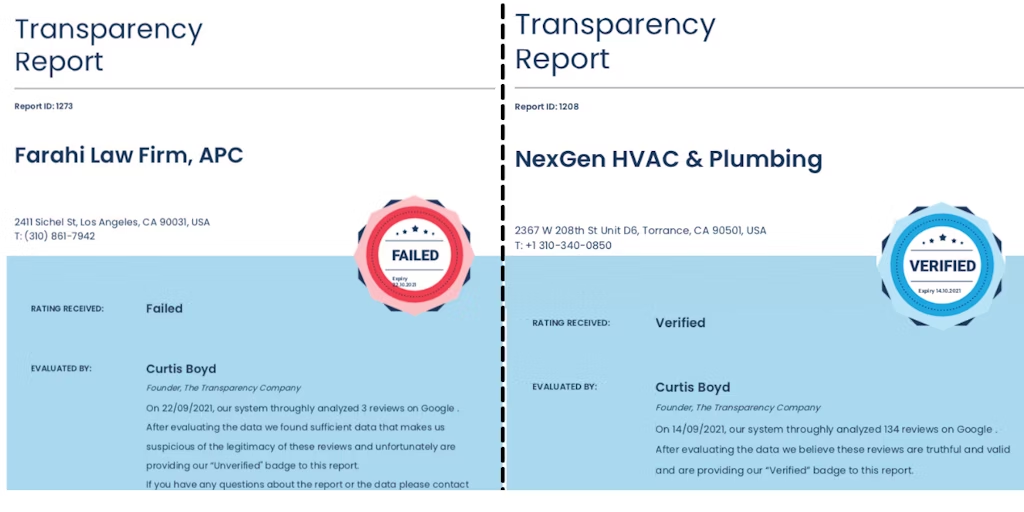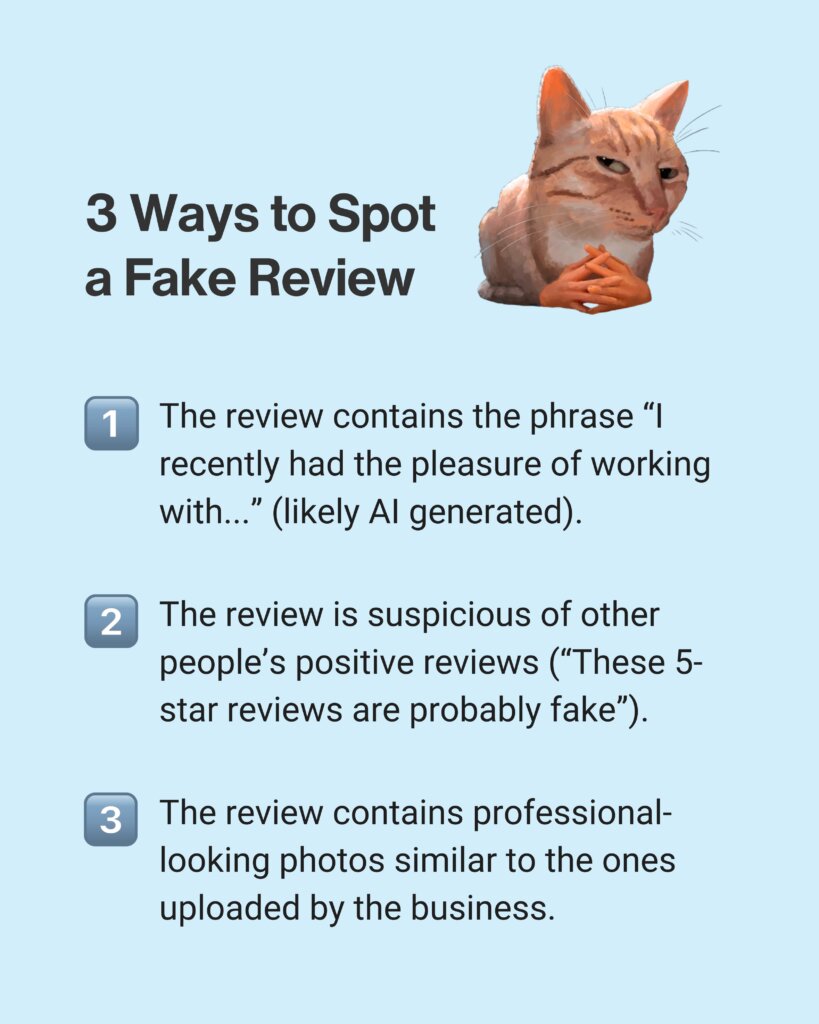🤓 The 2026 Local Search Ranking Factors are here!! Check out the report!
🤓 The 2026 Local Search Ranking Factors are here!! Check out the report!



The next two years are going to be a very rough ride for both local brands and their customers, according to the findings of The Transparency Company’s must-read report: The High Cost of Review Fraud: An Economic Analysis of Consumer Harm. The study finds that consumers are already suffering $300 billion in annual harm from review fraud in just three business sectors, and there is so much more to this story.
As a seasoned local SEO, I consider myself highly review spam-aware, but even I found some of the data in this report so shocking that I wanted to reach out to Transparency Company founder, Curtis Boyd, and Near Media co-founder, Greg Sterling, who authored the report with Robert Cavazos, to better understand some of the impacts of the data they’ve uncovered.
Whether you own or market local businesses, or simply depend to some degree on reviews to evaluate them as a consumer, this brief interview will help you move into the review fraud future better prepared.
Miriam: The most shocking scenario mentioned in your report involved unethical doctors recommending unnecessary surgeries in exchange for kickbacks from a hospital group. These doctors bolstered their reputations by buying fake reviews. You further mentioned that there are free tools consumers can use to help them detect review fraud. Would you mind sharing a few of these tools, and your opinion of their quality, given the dire risks involved to people’s health and safety?
Greg: Fakespot (part of Mozilla) and The Transparency Company are currently the only review fraud detection tools accessible to consumers. Another tool, ReviewMeta, shut down in 2023. The Transparency Company’s tool is focused on Google, and Fakespot looks at online retail sites such as Amazon, BestBuy, Walmart, and a few others.

Another thing consumers can do is check multiple sites for the same business, for example Google, Yelp, and others (e.g. vertical review sites) where relevant. This is cumbersome but it will provide some insight into the veracity of reviews on any given site. And many consumers simply look at review counts and star ratings. Taking the time to read reviews (especially critical reviews) is an important thing to do.
Miriam: In addition to using free tools to detect review fraud, can you list what you consider the top 3 warning signs a consumer can learn to recognize as review fraud red flags?
Curtis: #1 – Be wary of reviews that contain the phrase “I recently had the privilege of working with,” which seems to be trending with AI reviews. #2 – Look for negative reviews that are suspicious of the positive reviews: “These 5-star reviews are likely fake”. #3 – If you’re seeing too many groomed photos (images that look like they were taken by the brand), be more wary as many review farms have taken extra steps to attach photos chosen by the business owners.

Miriam: While the concept of a business writing or buying fake positive reviews to bolster its rankings and revenue is fairly easy to grasp, your study references review hijacking. Can you paint a picture of how this works for the sake of both brand and consumer awareness?
Curtis: Yes. Occasionally, Google Business Profile listings will be hijacked by lead-gen companies for the sake of their reviews. These companies change the name/category/phone number of the Profile to try and get a couple of leads when/if the listing is properly re-claimed by the rightful owner. It’s more common than you would think, and causes a great deal of trouble for businesses and consumers.
Miriam: Your report goes deep on the problem of Local Services Ads review spam. Google has recently made the change of sourcing reviews from GBP instead of from a separate LSA interface. I have seen sentiment to the effect that this will decrease review fraud associated with participating businesses that have been stamped with Google guarantees, but am I right in suspecting that little improvement will occur, given your findings concerning the massive amount of review fraud across the board, regardless of platform? What is your take on this?
Greg: I believe this will reduce things like review hijacking, which was happening with LSAs. But it won’t eliminate the root cause of the problem. Google has been getting better at policing reviews, though, as the report points out, fraud is still widespread. The larger issue, obviously, is fraud on Google Business Profiles and the incentives to cheat, which are considerable. So the LSA fix is not unlike a band-aid on a gun-shot wound.
Miriam: You report that AI-generated reviews have increased 80% month-over-month since June 2023. For more than a decade, local SEOs have been familiar with the fraud scenario in which offshore call centers are creating fake listings and reviews, providing quotes to incoming customers, and then passing them off to extortionate local subcontractors. Do you believe that these offshore models are on the verge of becoming obsolete due to the ease with which AI can now be used by anyone for fraudulent purposes? And, if so, can you ballpark a predicted time frame for when AI-generated review fraud will become the dominant source of economic harm to review readers?
Curtis: No, unfortunately AI only helps these offshore lead-gen listing makers. They have a major network of fake Google Profiles, which allows them to replenish reviews when/if removed – as well as an extensive knowledge of how to quickly set up new GBPs that bypass Google’s spam filters. These offshore models aren’t going anywhere. If the rate of AI-generated content by bad actors continues on this magnitude, by the end of 2026 we could be seeing more AI-assisted reviews than human written reviews. Anticipating this, Yelp has already made the stance that AI-assisted reviews are against their TOS, while Amazon and Trustpilot say they have no issue with their users using GPT to write reviews.
Miriam: Given the shocking extent to which consumers are already being harmed, both financially and physically by review fraud, can you think of a viable offline replacement for online reviews that our tech-driven society would be willing to adopt? Something that actually merits more trust? Or am I woolgathering?
Greg: Not at all. Word of mouth is the oldest referral system. Anecdotally, I’ve seen people returning to that as a way to deal with untrustworthy online reviews. There are many “offline” places to get referrals and recommendations — clubs, friend networks, family, religious organizations, work colleagues (and some online forums) — and it’s time to pursue these channels again.
Miriam: Something I learned from the report is that AI-generated reviews frequently read like pipe dream “brand speak”. They extoll the virtues, brand names, and desired search phrases of businesses in a way few human consumers actually would. 20+ years of reading reviews has taught me that legitimate ones are commonly full of poor grammar and spelling. Do you think AI will be developed to better mimic the informal style of US-based reviewers, making it harder to detect fraud?
Greg: AI is only going to improve and become more “clever.” So I think the answer is yes, these AIs will be able to mimic human writing styles (Claude can do this already to a degree). I think the problem of AI scams and fraud are here to stay, unfortunately.
Review fraud has become a serious societal problem that will only be made worse by AI.
Given Curtis Boyd’s prediction that, by the end of 2026, we could be seeing more fraudulent, AI-generated local business reviews than authentic consumer sentiment, now is the time for the brands you market to begin strategizing around regaining the public’s trust. A recent large-scale review study I conducted with GatherUp’s Vice President, Mél Attia, found that 55% of consumers currently believe review platforms are winning the review spam battle. I expect this number to take a significant hit as AI makes the Internet less and less reflective of reality.
Thankfully, local business operations are largely grounded in real-world operations and first-hand consumer experiences. AI shareholders may want to social engineer a trip into fantasy land, but customers still need real places to buy bread, see a doctor, and book a hotel room. Real-world word-of-mouth recommendations, customer loyalty programs, and old-fashioned relationship building could become even more vital keys to healing the massive harm already being caused by review fraud. Bring this up at your next company/client meeting. It’s a subject that’s going to matter more and more as we move forward.

Miriam Ellis is a local SEO columnist and consultant. She has been cited as one of the top five most prolific women writers in the SEO industry. Miriam is also an award-winning fine artist and her work can be seen at MiriamEllis.com.
Whitespark provides powerful software and expert services to help businesses and agencies drive more leads through local search.
Founded in 2005 in Edmonton, Alberta, Canada, we initially offered web design and SEO services to local businesses. While we still work closely with many clients locally, we have successfully grown over the past 20 years to support over 100,000 enterprises, agencies, and small businesses globally with our cutting-edge software and services.